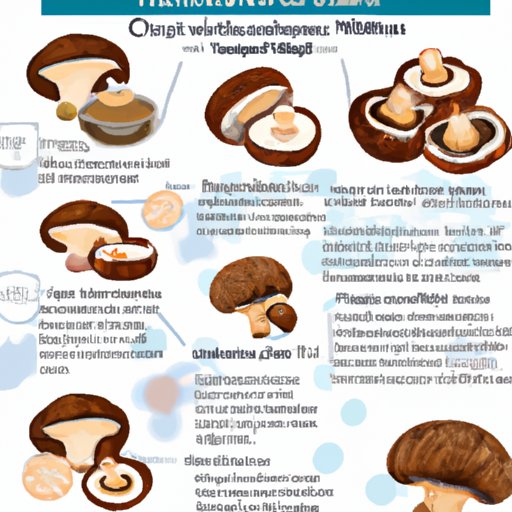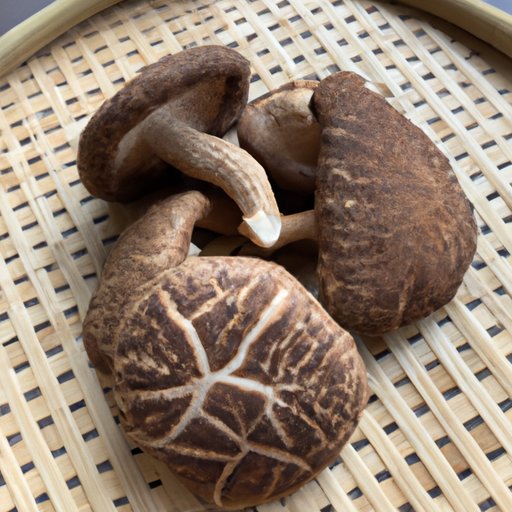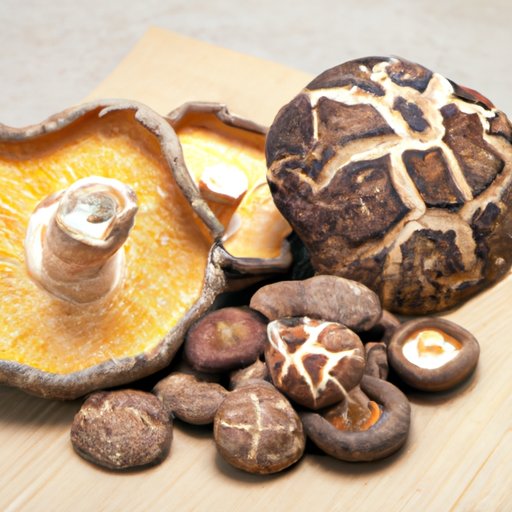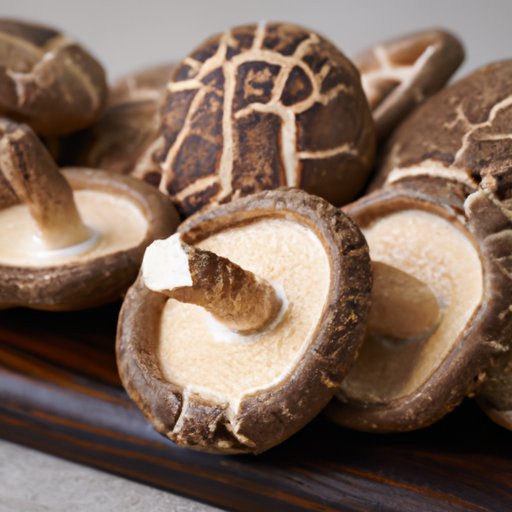Introduction
Shiitake mushrooms are a popular edible mushroom with a rich flavor and a wide range of potential health benefits. They have been used in traditional Chinese medicine for centuries and are now being studied in modern science for their potential medicinal properties. In this article, we will explore the nutritional benefits of shiitake mushrooms, their potential health benefits, their role in traditional Chinese medicine, and how to incorporate them into your diet for optimal health.
Exploring the Nutritional Benefits of Shiitake Mushrooms
Shiitake mushrooms are an excellent source of many essential vitamins and minerals, including selenium, potassium, zinc, and B vitamins. They are also a good source of dietary fiber and protein. In addition, shiitake mushrooms contain a variety of polyphenols, antioxidants, and other compounds that may provide health benefits.
Health Benefits Associated with Consuming Shiitake Mushrooms
Shiitake mushrooms have been linked to a number of potential health benefits, including improved immune system function, better digestive health, and improved heart health. Some research suggests that they may also help protect against certain types of cancer. However, more research is needed to confirm these potential benefits.

A Comprehensive Guide to the Health Benefits of Shiitake Mushrooms
Potential Benefits for Digestive Health
Shiitake mushrooms are a good source of dietary fiber, which can help promote healthy digestion and regularity. They are also a good source of prebiotics, which can help promote the growth of beneficial bacteria in the gut. Additionally, some studies suggest that shiitake mushrooms may help reduce inflammation in the gut, which can help improve digestive health.
Potential Benefits for Immune System Function
Shiitake mushrooms contain compounds that may help strengthen the immune system. For example, they contain beta-glucan, a type of fiber that has been shown to stimulate the production of white blood cells, which are important for fighting off infections. Additionally, shiitake mushrooms are a good source of vitamin D, which has been shown to play an important role in maintaining healthy immune system function.
Potential Benefits for Heart Health
Shiitake mushrooms contain compounds that may help reduce cholesterol levels and improve overall heart health. Additionally, they are a good source of potassium, which can help reduce blood pressure and reduce the risk of stroke and heart disease.

What You Need to Know About the Medicinal Properties of Shiitake Mushrooms
Historical Use of Shiitake Mushroom as a Medicine
Shiitake mushrooms have been used in traditional Chinese medicine for centuries. They were believed to have medicinal properties that could help treat a variety of ailments, such as fatigue, poor digestion, and skin problems. While some of these claims have yet to be scientifically proven, shiitake mushrooms are still used in traditional Chinese medicine today.
Compounds Found in Shiitake Mushrooms That May Have Medicinal Benefits
Shiitake mushrooms contain several compounds that may have medicinal properties. For example, they contain lentinan, a type of beta-glucan that has been studied for its potential anti-cancer effects. Additionally, they contain eritadenine, which has been studied for its potential to lower cholesterol levels. Finally, they contain kojic acid, which has been studied for its potential antiviral and antifungal properties.

An Overview of the Role of Shiitake Mushrooms in Traditional Chinese Medicine
Traditional Chinese Medicine Practices Involving Shiitake Mushrooms
In traditional Chinese medicine, shiitake mushrooms are often used in combination with other herbs and spices to treat a variety of ailments. For example, they may be combined with ginger and garlic to treat colds and flu. Additionally, they may be combined with ginseng and licorice to treat fatigue. In general, shiitake mushrooms are believed to help restore balance and harmony to the body.
Commonly Used Preparations of Shiitake Mushrooms
In traditional Chinese medicine, shiitake mushrooms are often prepared in various ways. For example, they may be dried and ground into a powder, or steeped in hot water to make a tea. Additionally, they may be cooked and eaten as part of a meal. The preparation method often depends on the condition being treated and the desired effect.
How to Incorporate Shiitake Mushrooms into Your Diet for Optimal Health
Tips for Including Shiitake Mushrooms in Your Diet
Shiitake mushrooms can be enjoyed in a variety of ways. They can be added to soups, stews, stir-fries, salads, and other dishes. Additionally, they can be cooked and eaten on their own as a side dish. When cooking shiitake mushrooms, it’s best to avoid high heat as this can destroy some of the beneficial nutrients.
Potential Side Effects of Eating Too Many Shiitake Mushrooms
Eating too many shiitake mushrooms can cause digestive issues, such as bloating, gas, and indigestion. Additionally, some people may be sensitive to the compounds found in shiitake mushrooms, which can cause allergic reactions. It’s best to consult with your doctor before adding shiitake mushrooms to your diet.
Conclusion
Shiitake mushrooms are a tasty and nutritious addition to any diet. They are packed with vitamins, minerals, and other beneficial compounds that may provide a variety of health benefits. They are also used in traditional Chinese medicine for their potential medicinal properties. When eaten in moderation, shiitake mushrooms can be a great way to improve your overall health and wellbeing.
This article has provided an overview of the potential health benefits and medicinal properties of shiitake mushrooms. We have discussed their nutritional profile, historical use in traditional Chinese medicine, and tips for incorporating them into your diet. For more information on the health benefits of shiitake mushrooms, please consult with your healthcare provider or do further research.
Recommendations for Further Reading
1. “The Health Benefits of Shiitake Mushrooms” by Dr. Josh Axe
2. “Shiitake Mushrooms: Nutrition, Health Benefits & Recipes” by Healthline
3. “Shiitake Mushrooms: A Comprehensive Review” by the National Institutes of Health
4. “Shiitake Mushrooms: A Traditional Chinese Medicine Perspective” by the National Center for Biotechnology Information
5.
(Note: Is this article not meeting your expectations? Do you have knowledge or insights to share? Unlock new opportunities and expand your reach by joining our authors team. Click Registration to join us and share your expertise with our readers.)
